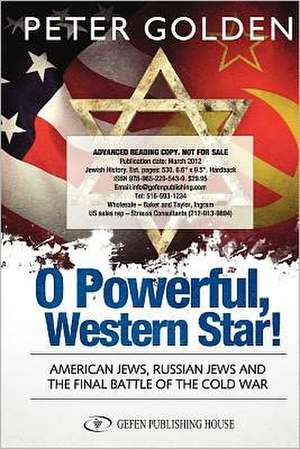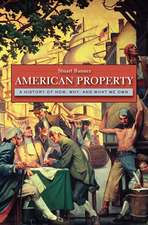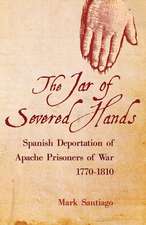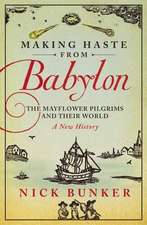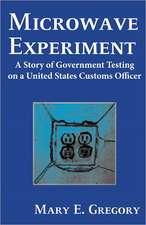O Powerful Western Star
Autor Peter Goldenen Limba Engleză Hardback – 30 apr 2012
Preț: 242.18 lei
Preț vechi: 271.07 lei
-11% Nou
Puncte Express: 363
Preț estimativ în valută:
46.34€ • 49.55$ • 38.64£
46.34€ • 49.55$ • 38.64£
Carte disponibilă
Livrare economică 27 martie-10 aprilie
Preluare comenzi: 021 569.72.76
Specificații
ISBN-13: 9789652295439
ISBN-10: 9652295434
Pagini: 569
Dimensiuni: 235 x 185 x 43 mm
Greutate: 1.16 kg
Editura: Gazelle Book Services Ltd
ISBN-10: 9652295434
Pagini: 569
Dimensiuni: 235 x 185 x 43 mm
Greutate: 1.16 kg
Editura: Gazelle Book Services Ltd
Recenzii
"An extensively researched history of the impact of the Cold War on Soviet Jews, Golden's book is largely concerned with the American Jewish community's efforts to help their Soviet counterparts emigrate from the flagrantly anti-Semitic U.S.S.R. under Stalin and his successors. Arguing that American Jews, in the wake of the Holocaust, feared they were abandoning Soviet Jews in the same way they had supposedly abandoned European Jews to Hitler (thus suffering from what "Dr Mortimer Ostow diagnosed as a kind of survivor guilt"), Golden guides the reader through a history of activism, from the formation of groups such as the American Jewish Conference on Soviet Jewry to the militarisation of the Jewish Defense League. As the plight of Soviet Jewry eventually becomes inextricably linked to Cold War, Golden illustrates how activists attempted to navigate the counterproductive goals of Nixon's policy and Kissinger's realpolitik, as well as the efforts of Israel and the U.S.S.R. to undermine the movement. Given its politically-charged subject matter, Golden (The Quiet Diplomat) is remarkably even-handed (he proves equally critical of Israel, America, and the U.S.S.R.), but his narrative -- based on thorough research and interviews with Gorbachev, Reagan, Nixon, Kissinger, and others -- can be tangential and disorganised, tending to follow a single figure or movement for a while before backtracking in a manner that only muddies the already complex Cold War history he is trying to illuminate." (Mar.) --Publishers Weekly
"An extensively researched history of the impact of the Cold War on Soviet Jews, Golden's book is largely concerned with the American Jewish community's efforts to help their Soviet counterparts emigrate from the flagrantly anti-Semitic U.S.S.R. under Stalin and his successors. Arguing that American Jews, in the wake of the Holocaust, feared they were abandoning Soviet Jews in the same way they had supposedly abandoned European Jews to Hitler (thus suffering from what "Dr Mortimer Ostow diagnosed as a kind of survivor guilt"), Golden guides the reader through a history of activism, from the formation of groups such as the American Jewish Conference on Soviet Jewry to the militarisation of the Jewish Defense League. As the plight of Soviet Jewry eventually becomes inextricably linked to Cold War, Golden illustrates how activists attempted to navigate the counterproductive goals of Nixon's policy and Kissinger's realpolitik, as well as the efforts of Israel and the U.S.S.R. to undermine the movement. Given its politically-charged subject matter, Golden (The Quiet Diplomat) is remarkably even-handed (he proves equally critical of Israel, America, and the U.S.S.R.), but his narrative -- based on thorough research and interviews with Gorbachev, Reagan, Nixon, Kissinger, and others -- can be tangential and disorganised, tending to follow a single figure or movement for a while before backtracking in a manner that only muddies the already complex Cold War history he is trying to illuminate." (Mar.) --Publishers Weekly
"An extensively researched history of the impact of the Cold War on Soviet Jews, Golden's book is largely concerned with the American Jewish community's efforts to help their Soviet counterparts emigrate from the flagrantly anti-Semitic U.S.S.R. under Stalin and his successors. Arguing that American Jews, in the wake of the Holocaust, feared they were abandoning Soviet Jews in the same way they had supposedly abandoned European Jews to Hitler (thus suffering from what "Dr Mortimer Ostow diagnosed as a kind of survivor guilt"), Golden guides the reader through a history of activism, from the formation of groups such as the American Jewish Conference on Soviet Jewry to the militarisation of the Jewish Defense League. As the plight of Soviet Jewry eventually becomes inextricably linked to Cold War, Golden illustrates how activists attempted to navigate the counterproductive goals of Nixon's policy and Kissinger's realpolitik, as well as the efforts of Israel and the U.S.S.R. to undermine the movement. Given its politically-charged subject matter, Golden (The Quiet Diplomat) is remarkably even-handed (he proves equally critical of Israel, America, and the U.S.S.R.), but his narrative -- based on thorough research and interviews with Gorbachev, Reagan, Nixon, Kissinger, and others -- can be tangential and disorganised, tending to follow a single figure or movement for a while before backtracking in a manner that only muddies the already complex Cold War history he is trying to illuminate." (Mar.) --Publishers Weekly
